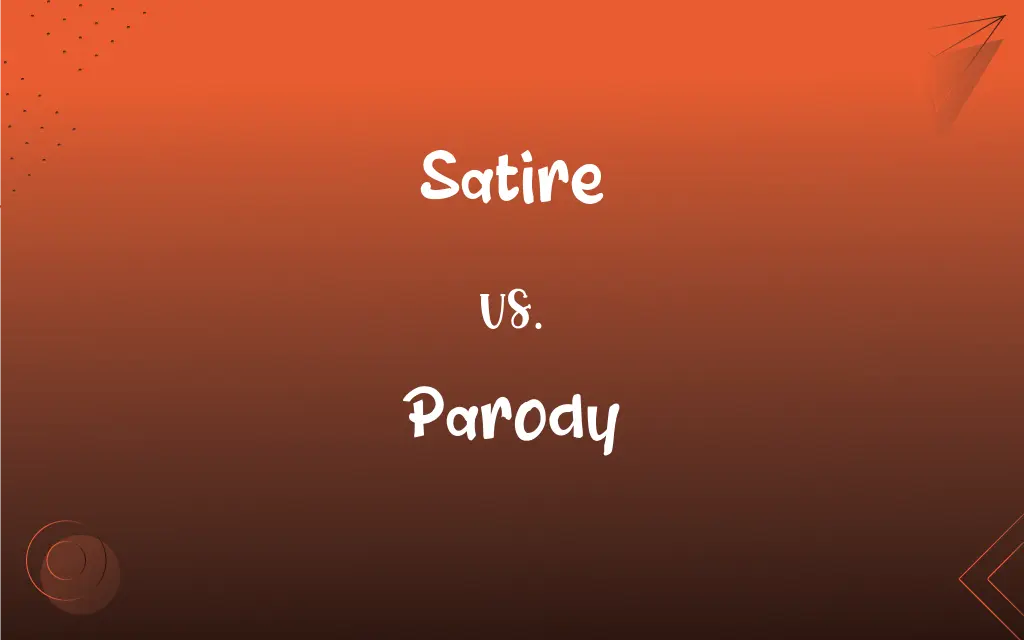Satire vs. Parody: What's the Difference?
Edited by Aimie Carlson || By Janet White || Published on October 17, 2023
Satire uses humor, irony, or exaggeration to expose and criticize, while parody mimics the style of a particular genre or work.

Key Differences
Satire is a literary genre or form that employs humor, irony, exaggeration, or ridicule to expose and criticize people's stupidity or vices, typically in the context of contemporary politics and other topical issues. In contrast, parody is a humorous or satirical imitation of a piece of literature, art, or music, exaggerating or distorting the original style or content for comedic effect.
While satire can be subtle and sophisticated in highlighting the flaws, follies, and shortcomings of individuals, society, or institutions, parody, on the other hand, is more overt and comical, usually relying on exaggeration and mimicry to create humor and lampoon the original work or style.
The intent of satire is often to provoke thought, reflection, and potentially change by offering a critical perspective on the subject matter, using wit as a weapon to convey its message. Conversely, parody, while it can offer criticism, primarily aims to entertain by amusingly replicating and overstating characteristic features of the targeted style or work.
Satire often implies a higher purpose of correcting or bettering society and its institutions by laying bare their absurdities and deficiencies, thereby fostering intellectual and moral improvement. Parody, although it can carry an undercurrent of critique, primarily seeks to amuse its audience by presenting a comical rendition of its subject.
In summary, satire is broader and more cerebral in its approach and goals, seeking to instigate change through intelligent critique and moral commentary, whereas parody is narrower, focusing on humorous imitation and exaggeration of specific works or styles, with the main goal of entertaining.
ADVERTISEMENT
Comparison Chart
Purpose
Criticize and provoke thought/change.
Entertain through imitation and exaggeration.
Focus
Individual's/society's flaws and vices.
Specific work or style's characteristic features.
Approach
Subtle, sophisticated, and cerebral.
Overt, comical, and exaggerated.
Intention
Moral and intellectual improvement.
Amusement and entertainment.
Scope
Broader, addressing various subjects.
Narrower, targeting specific works or styles.
ADVERTISEMENT
Satire and Parody Definitions
Satire
A form of humor highlighting the stupidities or flaws in individuals, politics, or society.
“The Daily Show” uses satire to comment on current events and public figures.
Parody
An imitation of the style of a particular writer, artist, or genre for humor.
“Weird Al” Yankovic creates parodies of popular songs, altering the lyrics for comedic impact.
Satire
A way to expose and ridicule the folly or corruption of individuals or society.
Jonathan Swift’s “A Modest Proposal” is a satire suggesting absurd solutions to pressing social issues.
Parody
A comedic imitation of another work, exaggerating its features.
“Spaceballs” is a parody of “Star Wars,” exaggerating its iconic elements for comedic effect.
Satire
A literary technique using humor and irony to criticize or mock.
“Animal Farm” by George Orwell is a piece of satire critiquing totalitarian regimes.
Parody
A work intended to mock by mimicking and exaggerating its subject.
The Scary Movie series is known for its parodies of popular horror films.
Satire
A genre intended to improve society by pointing out its flaws using wit.
Political cartoons often use satire to address the inadequacies of governmental policies.
Parody
A humorous or satirical mimicry of any style, work, or character.
The Onion often produces parody articles, imitating the style of serious news outlets.
Satire
The use of sarcasm, irony, or ridicule to expose and denounce vice or folly.
“Saturday Night Live” employs satire to comment on contemporary political and social issues.
Parody
A form of entertainment that humorously exaggerates specific features of the original work.
“Shrek” is a parody of fairy tales, mocking and exaggerating their common tropes.
Satire
A literary work in which human foolishness or vice is attacked through irony, derision, or wit.
Parody
A literary or artistic work that uses imitation, as of the characteristic style of an author or a work, for comic effect or ridicule.
Satire
The branch of literature constituting such works.
Parody
A genre, as in literature, comprising such works.
Satire
Irony, sarcasm, or caustic wit used to attack or expose human foolishness or vice.
Parody
Something so bad as to be equivalent to intentional mockery; a travesty
The trial was a parody of justice.
Satire
(uncountable) A literary device of writing or art which principally ridicules its subject often as an intended means of provoking or preventing change or highlighting a shortcoming in the work of another. Humor, irony, and exaggeration are often used to aid this.
Parody
(Music) The practice of reworking an already established composition, especially the incorporation into the Mass of material borrowed from other works, such as motets or madrigals.
Satire
(countable) A satirical work.
A stinging satire of American politics.
Parody
To make a parody of.
Satire
Severity of remark.
Parody
A work or performance that imitates another work or performance with ridicule or irony.
Satire
A composition, generally poetical, holding up vice or folly to reprobation; a keen or severe exposure of what in public or private morals deserves rebuke; an invective poem; as, the Satires of Juvenal.
Parody
A popular maxim, adage, or proverb.
Satire
Keeness and severity of remark; caustic exposure to reprobation; trenchant wit; sarcasm.
Parody
To make a parody of something.
The comedy movie parodied the entire Western genre.
Satire
Witty language used to convey insults or scorn;
He used sarcasm to upset his opponent
Irony is wasted on the stupid
Satire is a sort of glass, wherein beholders do generally discover everybody's face but their own
Parody
A writing in which the language or sentiment of an author is mimicked; especially, a kind of literary pleasantry, in which what is written on one subject is altered, and applied to another by way of burlesque; travesty.
The lively parody which he wrote . . . on Dryden's "Hind and Panther" was received with great applause.
Parody
A popular maxim, adage, or proverb.
Parody
To write a parody upon; to burlesque.
I have translated, or rather parodied, a poem of Horace.
Parody
A composition that imitates somebody's style in a humorous way
Parody
Humorous or satirical mimicry
Parody
Make a spoof of or make fun of
Parody
Make a parody of;
The students spoofed the teachers
FAQs
Can a parody be serious?
Parodies are typically humorous and exaggerated, but they can convey serious criticism or commentary.
Can satire be a parody?
While satire can employ parody as a method, it also uses other techniques like irony and exaggeration to critique.
Is all satire funny?
While satire often employs humor, it can also be dark or ironic, focusing on critique and provocation.
Do satires always criticize?
The primary goal of satire is to critique, but it can also illuminate and offer insight through humor.
Can parodies be disrespectful?
While the intent is often humorous, parodies can be seen as disrespectful if they mock sensitive subjects.
Is all satire political?
While often used for political commentary, satire can address a variety of subjects, including societal norms and human behavior.
How does satire use exaggeration?
Satire uses exaggeration to highlight flaws and absurdities, making them more apparent and critiquable.
Is parody a form of satire?
Yes, parody is a specific form of satire that mimics and exaggerates to criticize or mock.
Why is satire important?
Satire provides societal critique, encouraging reflection, discussion, and change through humor and irony.
Is parody protected by law?
Yes, parody is often protected under fair use, allowing for criticism and commentary of the original work.
Can you parody a parody?
Yes, it’s possible to create a parody of a parody, adding another layer of exaggeration and humor.
Why do people create parodies?
Parodies are created for entertainment, to offer humorous critique, and to engage with popular culture by mimicking its forms.
Can parody be a form of flattery?
While parody mimics, it can be seen as a form of flattery by acknowledging the impact or success of the original work.
How is satire different from sarcasm?
Satire is a broader, more sophisticated form of criticism, while sarcasm is a form of verbal irony meant to mock or convey contempt.
Can parody be subtle?
While parody often involves overt exaggeration, it can employ subtlety to convey humor or critique.
About Author
Written by
Janet WhiteJanet White has been an esteemed writer and blogger for Difference Wiki. Holding a Master's degree in Science and Medical Journalism from the prestigious Boston University, she has consistently demonstrated her expertise and passion for her field. When she's not immersed in her work, Janet relishes her time exercising, delving into a good book, and cherishing moments with friends and family.
Edited by
Aimie CarlsonAimie Carlson, holding a master's degree in English literature, is a fervent English language enthusiast. She lends her writing talents to Difference Wiki, a prominent website that specializes in comparisons, offering readers insightful analyses that both captivate and inform.































































